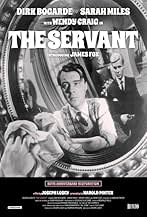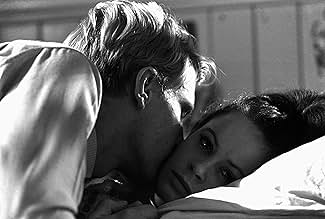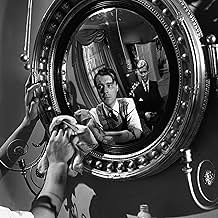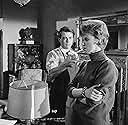Upper-class Tony hires servant Hugo Barrett, who turns out to have a hidden agenda.Upper-class Tony hires servant Hugo Barrett, who turns out to have a hidden agenda.Upper-class Tony hires servant Hugo Barrett, who turns out to have a hidden agenda.
- Won 3 BAFTA Awards
- 8 wins & 11 nominations total
Doris Nolan
- People in restaurant: Older Woman
- (as Doris Knox)
- Director
- Writers
- All cast & crew
- Production, box office & more at IMDbPro
Featured reviews
While this little known British classic has been badly neglected for the last thirty years or so, it shouldn't be; it is one of the most expertly realized portraits of British class warfare ever. Aside from Bogarde's (obviously) letter perfect portrayal of a sinister lower class valet with some ugly designs on his upper crust victim (well played also, by James Fox, who came to specialize in similar roles), one scene in particular stands out, and underlines beautifully the whole film's entire message. When Fox's aristocratic girlfriend (played by Wendy Craig) comes to visit, she has an amazing encounter with Bogarde. She suspects he's moving in on her boyfriend, ready to replace her in his affections. She imperiously orders him into the front room, abruptly quizzing him for his opinions on just about everything. She isn't concerned with his answers-she just enjoys ordering him around, Queen Victoria style. The effect is stunning-Bogarde clearly wants to strangle the bitch, but must restrain himself, he's only the servant after all. But he's still a man, and will get his revenge soon enough. The whole upper class system will be turned on its head. The resolution (if it can be called that) is not totally satisfying. In fact, it seems just as confused just and messy as life itself is.
Some reviewers have stated that Ms. Craig was miscast as the classy girlfriend. Not so-as she imperiously and hatefully orders the helpless servant around, her face and voice become a hateful mask of the arrogance and cruelty of British snobbery. A minor classic of its kind, somewhat dated, but still relevant and brilliantly filmed in moody black and white, and Bogarde's best moments on film.
Some reviewers have stated that Ms. Craig was miscast as the classy girlfriend. Not so-as she imperiously and hatefully orders the helpless servant around, her face and voice become a hateful mask of the arrogance and cruelty of British snobbery. A minor classic of its kind, somewhat dated, but still relevant and brilliantly filmed in moody black and white, and Bogarde's best moments on film.
An intimately crafted psychological drama, The Servant is a remarkable film that deserves to be seen by all. Written by Harold Pinter, based on a novel by Robin Maugham, it is a stunningly intelligent dissection of two men, the upper crust Tony (James Fox) and his new servant, Hugo Barrett (Dirk Bogarde). Through these two characters, Pinter's script unravels sharp ups and downs of class warfare and sexual games, as the two men constantly play a tug of war for power in all forms. When they first meet the two seem to hit it off quite well, falling comfortably into their positions of servant and master.
However, once Tony's fiancée Susan (Wendy Craig) comes into the mix and disapproves of Barrett, things start to become more conflicted. Then, Barrett's "sister" Vera (Sarah Miles) comes to move in and her true nature, as Barrett's lover, throws an even stronger rift between the two and their class positioning. The intrusion of these women sets off a descent from their idyllic lifestyle and the two men spend the rest of the time clashing with one another, the walls slowly closing in on this gripping and powerful study.
Director Joseph Losey makes great work of his tools here, using a lot of unique camera techniques like splitting the focus and viewing the characters through reflective surfaces rather than directly, which all serve to heighten the already high tension. The structure is bizarre and the final act gets surprisingly dark and borderline surreal, as the two engage in a series of fascinating interactions to further dissect the state of their dynamic. The Servant would be absolutely nothing without the performances of it's two men, and they both deliver in equal measures. The women are both superb as well, Craig being sharp and vicious, Miles being naive and sensual, but it's the boys show all the way through.
Bogarde is breathtaking, convincingly portraying the "gentleman's gentleman" of a butler at first but slowly turning more sinister and terrifying as time passes on. He plays all sides of this character with total life, always remaining a mystery to the audience as we are never sure whether he is fooling Tony and us or if he's being sincere at any given moment. There's a scene between him and Susan where she digs into him and the pain on his face, the emasculation, actually allows the viewer to feel deeply for what could have been a very unlikeable character.
Fox is no dull edge either, meeting Bogarde with a heartbreaking descent, falling from the mannered and composed young man we first meet into the shriveled and destroyed wreck by the end. The shifting dynamics between the two are always engaging, and Pinter embeds the film with just the right amount of emotion, comedy, terror and homoerotic subtext. It's a shattering work, marvelously performed by everyone involved.
However, once Tony's fiancée Susan (Wendy Craig) comes into the mix and disapproves of Barrett, things start to become more conflicted. Then, Barrett's "sister" Vera (Sarah Miles) comes to move in and her true nature, as Barrett's lover, throws an even stronger rift between the two and their class positioning. The intrusion of these women sets off a descent from their idyllic lifestyle and the two men spend the rest of the time clashing with one another, the walls slowly closing in on this gripping and powerful study.
Director Joseph Losey makes great work of his tools here, using a lot of unique camera techniques like splitting the focus and viewing the characters through reflective surfaces rather than directly, which all serve to heighten the already high tension. The structure is bizarre and the final act gets surprisingly dark and borderline surreal, as the two engage in a series of fascinating interactions to further dissect the state of their dynamic. The Servant would be absolutely nothing without the performances of it's two men, and they both deliver in equal measures. The women are both superb as well, Craig being sharp and vicious, Miles being naive and sensual, but it's the boys show all the way through.
Bogarde is breathtaking, convincingly portraying the "gentleman's gentleman" of a butler at first but slowly turning more sinister and terrifying as time passes on. He plays all sides of this character with total life, always remaining a mystery to the audience as we are never sure whether he is fooling Tony and us or if he's being sincere at any given moment. There's a scene between him and Susan where she digs into him and the pain on his face, the emasculation, actually allows the viewer to feel deeply for what could have been a very unlikeable character.
Fox is no dull edge either, meeting Bogarde with a heartbreaking descent, falling from the mannered and composed young man we first meet into the shriveled and destroyed wreck by the end. The shifting dynamics between the two are always engaging, and Pinter embeds the film with just the right amount of emotion, comedy, terror and homoerotic subtext. It's a shattering work, marvelously performed by everyone involved.
The song ' All Gone ' is played periodically through the duration of ' The Servant ' and it somehow sums the whole thing up. The period of the early sixties are long since gone, but the class divisions remain for better or worse ( mainly worse ) and in that sense the film is entirely relevant to today. I have seen this film only twice in my life, but giving myself a Joseph Losey ' season ' as they used to do, once upon the time, on the UK's BBC, but that too seems to be gone, reminds me of what we have lost in the cinema. Is it one of Losey's best films ? With certain reservations I think it is, and the merciless depiction of so-called ' order ' disintegrating into ' disorder ' sticks to the mind like glue. Except for a few exterior shots of Chelsea and a snow bound countryside the claustrophobia of the house in which the drama plays is palpable. You need air after watching this and to call it a drama is a bit of an overstatement. It is half way Harold Pinter and half way Samuel Beckett. Everything happens, and nothing happens, and the perennial Jean-Paul Sartre's ' Huis Clos ' and Harold Pinter's theatrical work in general, plus Samuel Beckett's ' Waiting for Godot ' come to mind. A closed universe without escape. Society's divisions of class and the trap of human life in itself are clearly visible. I am reluctant to give any spoilers except to say a manservant overwhelms the master of a house, and the temptations of losing control are too overwhelming for the master to resist. James Fox is excellent as the master, too passive to fight back and Dirk Bogarde gives arguably his best performance as a slightly camp manservant, and the obvious ( to me ) bisexuality between them also binds them together. Women are ' used ' in this scenario and to a certain extent Wendy Craig loses her righteous dignity and Sarah Miles as Bogarde's accomplice sinks further and further into self-degradation. It is perfect casting and Losey knew exactly what he was doing in choosing the actors. A party scene played as if it is in a mortuary appears dated, but looked at closely and listened to attentively it is entropy exemplified. A woman in black appears to hand out drugs to keep the master in a perpetual coma, and the other women in the room can barely move never mind indulge in any sexual acts. To sum up Losey sees a world collapsing into its inevitable oblivion. We the viewers watch, and despite having little background information about the characters we can draw own conclusions about what we are seeing, and like the people in the film gaze into mirrors as the only moorings to reflect our existence. A must see film but is its pessimism too hard to bear ?
If you watch closely you will find that not only does the internal decoration of the house change (in ways not included in the plot) to become gradually darker as Tony is gradually undermined and seduced by Barrett but also the excellent (but very much of its time) soundtrack by Johnny Dankworth & (surely - or is my recollection wrong?) Cleo Laine - though the same LP is put on the turntable many times, the arrangement of the same theme is different. (I did not notice this at first but found it pointed out in a special issue of the Oxford University magazine Isis at the time the film was released that was entirely devoted to it.) The film has recently reappeared in England as a stage work: Play without Words, seen at the National Theatre, is (was, I guess, is more accurate) a superb piece of dance theatre in which the ambiguities of the characters' motivations, or the discrepancies between their thoughts and actions, are portrayed by having more than one dancer per character. Sometimes only one is seen, sometimes they move in unison, sometimes in separate ways. It is extremely effective.
About midpoint Tony's girlfriend Susan asks servant Hugo, "What do you want from this house?" It's a direct and pointed question that's ambiguously answered ("I'm just the servant, mum.")
That ambiguity carries the dramatic tension along its murky but intriguing path, as a strange play of power and manipulation unfolds. Yet after a series of quirkly developments transpire and the tables of manservant and master are reversed, what's the real gain?
What was there in the house in the first place that was worth all the fuss and bother to acquire? Satisfaction of taking over the master role?
Whatever the goal, it all seems a tawdry victory. After the shoe's on the other foot and a few points are scored in this cheesy power game, where's the spoil?
What does drive this drama is Pinter's genius for inventing small talk that gives the illusion of grandeur Losey's direction is right on the mark, and the production design, score, photography--and the acting--are all top drawer.
As in his subversive play, "The Homecoming," Pinter manages to hold the attention with his unique pregnant pauses and hypnotic ambiance, which are actually illusionary. It could be a play about something very important or about nothing.
One thing is for certain: once "The Servant" is seen, one never quite forgets it.
This remains Dirk Bogarde's defining cinematic role.
That ambiguity carries the dramatic tension along its murky but intriguing path, as a strange play of power and manipulation unfolds. Yet after a series of quirkly developments transpire and the tables of manservant and master are reversed, what's the real gain?
What was there in the house in the first place that was worth all the fuss and bother to acquire? Satisfaction of taking over the master role?
Whatever the goal, it all seems a tawdry victory. After the shoe's on the other foot and a few points are scored in this cheesy power game, where's the spoil?
What does drive this drama is Pinter's genius for inventing small talk that gives the illusion of grandeur Losey's direction is right on the mark, and the production design, score, photography--and the acting--are all top drawer.
As in his subversive play, "The Homecoming," Pinter manages to hold the attention with his unique pregnant pauses and hypnotic ambiance, which are actually illusionary. It could be a play about something very important or about nothing.
One thing is for certain: once "The Servant" is seen, one never quite forgets it.
This remains Dirk Bogarde's defining cinematic role.
Did you know
- TriviaWhen producer and director Joseph Losey was hospitalized with a brutal case of pneumonia for two weeks during this shoot, Dirk Bogarde continued filming assisted by minute, daily instructions over the phone from Losey's hospital bed. When Losey returned to the set, he did not re-shoot any of the script, much to the relief of cast and crew. Bogarde managed to keep the film on schedule, though he later said the experience made him determined never to direct.
- GoofsWhen Tony and Susan arrive at Tony's house in the Mercedes, with an extended visit in mind, they both go into the house and Tony leaves the car's lights on.
- Quotes
Hugo Barrett: I'll tell you what I am. I'm a gentleman's gentleman, and you're no bloody GENTLEMAN!
- ConnectionsFeatured in Stairs (1986)
- How long is The Servant?Powered by Alexa
Details
Box office
- Gross US & Canada
- $45,522
- Opening weekend US & Canada
- $7,859
- Jul 28, 2013
- Gross worldwide
- $76,278
- Runtime
- 1h 56m(116 min)
- Color
- Aspect ratio
- 1.66 : 1
Contribute to this page
Suggest an edit or add missing content


































